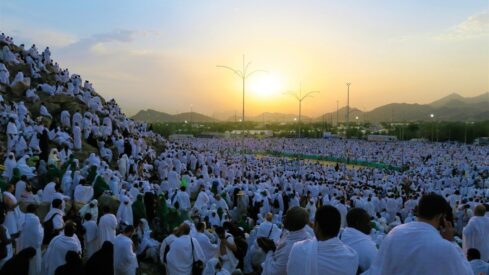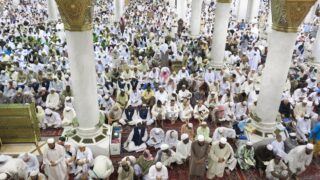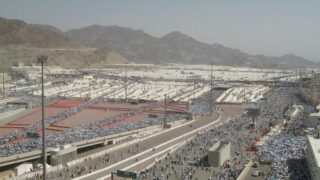In the context of legislating the acts of worship, the relevant Qur’anic verses focus on the Shar`i (i.e., juristic) objectives behind such acts of worship. This is because Almighty Allah knows that forgetfulness and negligence are instinctive elements of the nature of humans. Thus, when a long time passes and hearts are hardened, acts of worship turn, for some Muslims, into sheer rites and habitual practices in which they observe nothing but the outward appearance, with no spiritual impact felt in their hearts. They therefore indulge in the outward details and particulars of such acts of worship.
Then follows another stage: the state that befell the People of the Book because of their negligence of the Shar`i objectives. They introduced to their acts of worship new things inspired by their overestimation of the outward appearance of the worship and their dissociation from the essence, substance, and objectives of the worship.
Whoever assimilates and meditates on this issue will perceive an aspect of the perfect wisdom of repeatedly mentioning the objectives of the acts of worship in the Qur’an. For example, speaking of Prayer (which is the topmost of these acts of worship), Almighty Allah affirms its influence on molding the Muslims’ conduct:
(Lo! Prayer restrains (one) from lewdness and iniquity) (Al-`Ankabut 29:45)
As regards Zakah (obligatory alms), Prophet Muhammad (peace and blessings be upon him) was emphatically commanded by Almighty Allah to take alms from the Muslims’ wealth as a means to cleanse and purify them. He was also commanded to invoke Allah’s mercy for them. Therefore, whenever a group of people brought the Zakah due on them to him, he would invoke Allah’s mercy for them.
Speaking of fasting within a detailed and telling context, Almighty Allah says, (That you may attain piety) (Al-Baqarah 2:183). Regarding immolations, namely, the animals offered in sacrifice during the rituals of Hajj, Almighty Allah says,
(It is neither their meat nor their blood that reaches Allah, but it is piety from you that reaches Him) (Al-Hajj 22:37)
Moreover, within the verses speaking of Hajj, Almighty Allah clearly reveals the objective behind this obligation and all its rituals:
(That they may mention the Name of Allah) (Al-Hajj 22:34)
That was why the Mother of the Believers `A’ishah (may Allah be pleased with her) reportedly said, “Indeed, Tawaf [circumambulation of the Ka`bah], Sa`i [walking between Safa and Marwah], and throwing pebbles were legislated only for the frequent mention of Allah’s Name” (reported by Ad-Darimi, Abu Dawud, and Ahmad).
Do such significant and noble meanings really come to the minds of the believers when they circumambulate the Ka`bah? Or is it only the spirit of competing and gaining precedence over others that preoccupies them and makes them jostle against other pilgrims, shove them with the shoulders, push them with the hands, and argue with them, as if Hajj were a battlefield?
During Hajj, some pilgrims jostle against the others in the crowded places, seeking to go ahead of them to brag about finishing in minutes the rituals that others carry out in hours. These people should know that the Prophet instructed the pilgrims who were leaving `Arafah together for Muzdalifah, saying,
“O people! Be quiet. Hastening is not a sign of righteousness.” (Al-Bukhari)
Hence, righteousness is the objective of Hajj, and it cannot be achieved through haste and hustle; rather, it can be attained through tranquility and submissiveness to Almighty Allah. Does this meaning cross the believers’ minds upon throwing the pebbles, when they have recalled what they heard or witnessed about the difficulty of that situation, about death lying in wait for pilgrims trampled upon by other pilgrims? Do they think of the objective of attaining righteousness when they remember lengthy conversations they previously held with companions of theirs regarding the attitude of jostling and jolting during the throwing of the pebbles?
Collective Worship and Divine Refinement
The collective acts of worship refine people’s hearts and manners. Through such acts of worship, the believers learn to accurately and devoutly perform their duties and maintain the rights and properties of others. They learn to honor the old, have mercy on the young, and sympathize with the stranger, the weak, and the ignorant. In this regard, Almighty Allah says, (The pilgrimage is (in) the well-known months, so if anyone undertakes that duty therein, let there be no obscenity, nor wickedness, nor wrangling in the Hajj) (Al-Baqarah 2:197).
Muslims’ acts of worship greatly help them reduce their attachment to worldly pleasures and desires. For example, a person entering into ihram (state of consecration) for Hajj is prohibited from engaging in a sexual relation or foreplay with his or her spouse. This prohibition is unanimously agreed upon among the scholars. It also covers redundant talks about women in a way that stirs desires.
Commenting on the verse quoted above, Al-Awza`i maintained that the muhrim (the person in ihram) who calls names or curses is required to offer a sacrifice. Although Al-Awza`i’s opinion is outweighed by the opinions of other jurists, the wickedness committed by the pilgrim still represents a violation of the sanctity of Hajj rituals and of the Sacred Mosque, not to mention that it is already prohibited.
Unjust disputes and prolonged, unnecessary speeches are prohibited during Hajj. This is because the evil inclinations and selfishness of one’s soul drive one to tenaciously attempt to overcome others and have the final say in such disputes. Such people pay no attention to whether their position is right or wrong; they even fail to think of the possibility of being wrong. Imam Ash-Shafi`i (may Allah have mercy on him) used to say, “My opinion is correct with a possibility of error, and another person’s opinion is incorrect with a possibility of correctness.”
A wise man once said, “It is more proper for the likes of us to say, ‘Our opinion is a wrong one that could possibly be right!'”
Multiple Benefits
Swallowing a dose of a passing rage is better than engaging in a heated dispute with one’s companion or friend. Such disputes neither bring about benefit nor fend off harm; they neither bring one closer to Paradise nor distance one away from Hellfire. But few are those who grasp this fact.
Hajj rituals and all other acts of worship were legislated by Almighty Allah for great wisdom. They are meant to bring about worldly as well as otherworldly benefits. In the Qur’an, Almighty Allah says, (That they may witness things that are of benefit to them) (Al-Hajj 22:28).
As is indicated by a number of exegetes, such benefits include reward in the hereafter and also other worldly gains accrued through trade and business. This interpretation was reported by At-Tabarani from Mujahid, who said, “While it [i.e., the verse] refers to trade, it also refers to all that pleases Almighty Allah of worldly and otherworldly matters.” Moreover, At-Tabarani said, “The verse means that they may witness benefits for themselves through acts that please Allah and through trade, for Almighty Allah has used the general term things of benefit, which includes all forms of benefit, worldly and otherworldly, that can be gained during this season. This is because no type of such benefits was particularly reported in the religious texts or deduced therefrom.”
Undoubtedly, Almighty Allah is free of all wants and needs for anyone or anything. In this regard, Anas (may Allah be pleased with him) narrated that Prophet Muhammad (peace and blessings be upon him) saw an old man walking supported by his two sons. When the Prophet asked about him, the people informed him that the man had vowed to go on foot to the Ka`bah. Thereupon, the Prophet said, “Verily, Allah is in no need of this man’s torturing himself.” He then ordered him to ride (Al-Bukhari and Muslim).
Referring to immolation and sacrifices, Almighty Allah says, (It is neither their meat nor their blood that reaches Allah, but it is piety from you that reaches Him) (Al-Hajj 22:37).
However, it is surprising that many Muslims miss the virtues and objectives of Hajj, as well as its marvelous impact on their souls, conduct, and lives. Should they care about the spiritual and behavioral aspects of Hajj just as they care to inquire about the details of the rulings they are required to observe during Hajj, it would indeed be better and more appropriate for them.
This year’s season of Hajj approaches while the Western World is tightening its grip over the Islamic World. The West intends to reshuffle its papers after the war on Iraq and Afghanistan. The Western nations seek to reinforce their campaign through maintaining broad alliances, which they have been building for a long time. Sadly, most of the Muslims turn a blind eye to all of this; they are preoccupied with their own petty differences. Having despaired of triumphing over their enemy, they seem to be determined to achieve victory over one another.
As the blessed season of Hajj draws near, the world vigorously marches on its way to globalization, beginning by globalizing economy and earnestly proceeding toward globalizing culture, thought, media, and politics. Helping in this process are international institutions, such as the World Bank, the International Monetary Fund, and the World Trade Organization.
While Hajj is a gathering for worship, it is also a gathering for trade and politics, not in the limited sense that turns unity into disunity. Rather, it should be a congregation that tackles the supreme Islamic politics, organize the interests of the Ummah, draw up plans for its future, and lead its way through such raging seas.
By Sheikh Salman bin Fahd Al-`Udah*















